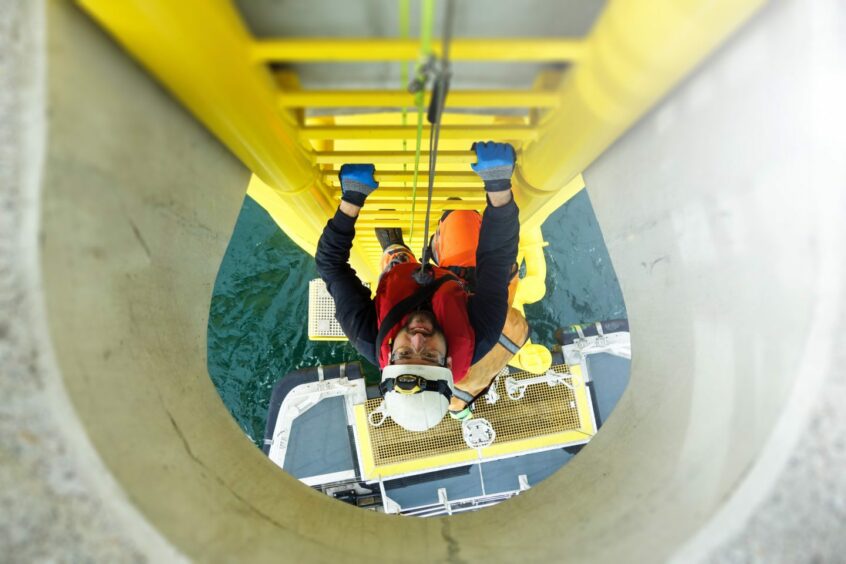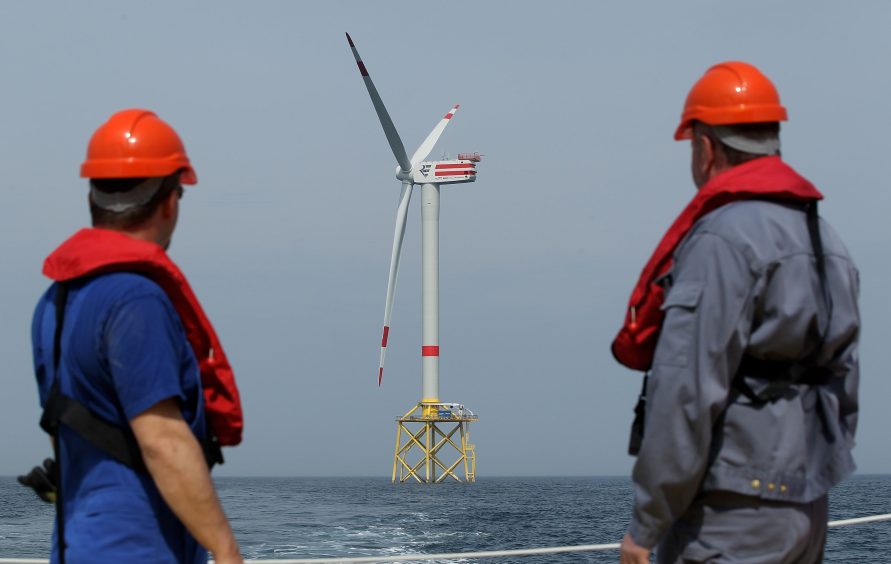
An energy skills passport to help workers transition their training and accreditations from oil and gas jobs to similar roles in the renewables sector has launched and will be expanded across the UK.
A pilot stage of the energy skills passport, which has been in planning since 2022, is now open for oil and gas workers to sign up and connect their verified skills and experience to relevant opportunities in renewables.
Supported by £3.7 million from the Scottish Government’s just transition fund, the passport will initially support workers to identify routes into roles in offshore wind.
The site will start by offering workers four “jobs pathways” into the sector, which is expected to support over 100,000 jobs by 2030. These will include: construction installation commissioning technician, maintenance technician, high voltage senior authorised person and troubleshooting roles.
Aberdeen, Cheshire, Lincolnshire, Pembrokeshire
With the energy skills passport taking a focus on the North Sea gateway of Aberdeen, the UK government has also identified Cheshire, Lincolnshire and Pembrokeshire as regions ripe for training centres and courses to upskill workers.
The government has pledged funding initially to Cheshire West and Chester, North and North East Lincolnshire and Pembrokeshire, with the potential to support the offshore wind sector in South Wales, or nuclear fuel cluster in Cheshire. Nottingham City Council’s Midlands net zero hub, the North West net zero hub and the Welsh Government will be allocated up to £1m each from the Office for Clean Energy Skills Fund.
In reaction, a spokesperson for the Offshore Co-ordinating Group (OCG) of trade unions said: “Urgent action is needed to protect offshore workers and supply chain jobs currently at risk from decommissioning
“There needs to be a clear plan to safeguard incomes, trade union rights, and safety standards.
“By engaging with UK and Scottish Governments, our aim is to maximise the benefits of the GB Energy Bill’s planning and public ownership powers to support workers facing increasing pressures from North Sea multinationals and contractors during the energy transition.”
It is ‘vital’ to retain skilled oil workers
Initially envisaged to launch in 2023, the energy skills passport is led by two trade bodies, Renewable UK and Offshore Energies UK (OEUK). It was developed in its early stages by skills provider, Opito, to address concerns that oil and gas workers faced barriers requiring expensive retraining in order to transfer into renewables.
Workers can now create an account which will signpost where their existing qualifications are across the energy sector. The partners have also committed to expand the tool over the coming year to recognise other pathways from oil and gas into the renewable sector.
As “significant” work identifying skills has already been done for Aberdeen, the passport has not received any extra cash in this latest announcement but it “will be considered for further funding”, a spokeswoman for the Department of Energy and Net Zero (DESNZ) said.
Once the passport is fully operational, the project aims to support a pipeline of workers needed to deliver clean power by 2030.
Acting Cabinet Secretary Gillian Martin said: “It is absolutely vital that we recognise and retain the considerable skills of oil and gas workers and ensure they are supported, as part of the Scottish Government’s commitment to ensuring a fair and just transition for Scotland.
“That’s why the Scottish Government has provided £3.7m of funding to support oil and gas and renewables industries to jointly develop the energy skills passport – helping to ensure that the skills, experience and expertise of oil and gas workers are harnessed and that they are ready to apply for the long term sustainable jobs that are created as part of our fair and managed transition to net zero.
“I welcome the pilot phase of the passport, which has been three years in the making and I look forward to seeing further developments in the coming months.”
Offshore energy workforce ‘broad range of skills’
OEUK director of supply chain and people, Katy Heidenreich said: “The UK’s offshore energy workforce has a proud heritage and continues to have high value jobs in oil and gas, which support a broad range of skills from engineering and construction to legal and commercial expertise. These skills are essential for the homegrown oil and gas the UK needs for decades to come together with the expansion in energy production we’ll need in future.
“This passport is all about helping people working in this industry to make informed decisions about their jobs and future. As we build a homegrown low carbon future, this passport can help them succeed in projects right across our diverse energy mix. We now look forward to working with policymakers to help unlock and enable the business investment we need for a new generation of good, high-value jobs and opportunities for firms and their people.”
RenewableUK’s executive director of offshore wind Jane Cooper said: “More than a hundred thousand people will be working in the UK’s offshore wind industry by 2030, mostly in highly skilled roles. To grow our world-class industry as fast as possible, we need the valuable experience that oil and gas workers can bring .
“The energy skills passport which we’re launching today with our OEUK colleagues offers a gateway for people to make this transition by helping them to identify which offshore wind roles which would suit them best, and setting out in detail the training they will need to secure these new job opportunities.
“It’s a practical tool which demonstrates our determination to bring the tangible benefits of the energy transition to workers right across the energy sector”.
Energy secretary Ed Miliband said: “Our plan for change to deliver clean power is not just about protecting households and businesses from the rollercoaster of fossil fuel markets, it is also about reindustrialising Britain with thousands of well-paid, good union jobs in industrial communities.
“Unlike the failed approach of previous governments, we won’t sit back and let good jobs go overseas instead of coming to our shores.
“We are working with communities, businesses, and trade unions to train workers here in Britain, so we can seize the opportunities that clean power brings.”
Secretary of State for Scotland Ian Murray said: “These new skills pilots in Aberdeen and Aberdeenshire will help our oil and gas workers move into renewables jobs and follow our recent action to accelerate the skills passport.
“We are cutting red tape and giving workers the flexibility to move between industries and take advantage of the opportunities that the clean energy transition will provide.”
Secretary of state for Wales Jo Stevens said: “There is huge potential for economic growth in Wales, fuelled by clean energy technology like floating offshore wind in the Celtic Sea.
“This skills pilot in Pembrokeshire will create a workforce here in Wales ready to take on a new generation of jobs in our mission to make Britain a clean energy superpower.”
Cllr Louise Gittins, leader of Cheshire West and Chester Council said the regional skills pilot will “play a crucial role in transitioning our workforce from carbon-intensive industries to clean energy sectors”.
She added: “As one of the centres of the net zero re-industrialisation of the North, we are committed to encouraging green economic growth and the benefits that will bring to our area.
“By addressing skill gaps and challenges through targeted interventions, we are not only supporting our residents to upskill, and our local economy to fill crucial skill requirements, but also contributing to the UK’s broader goal of achieving clean power by 2030.”
Jack Hayhoe, head of net zero programmes at Midlands Net Zero Hub said:“Our research into the low carbon environmental goods and services sector has demonstrated that a strategic approach to addressing skills gaps can unlock nearly £15 billion of economic growth in the region over the next five years.
“Not only will this work bolster the economy, the net zero transition will be transformational for communities in the Midlands, who are at the heart of our decarbonisation efforts.”
Recommended for you


 © Sean Gallup/Getty
© Sean Gallup/Getty © Supplied by ASV Photography Ltd.
© Supplied by ASV Photography Ltd.